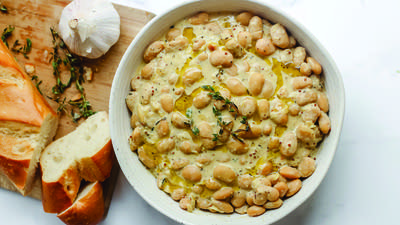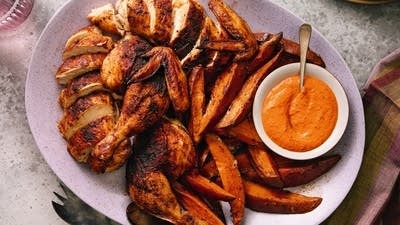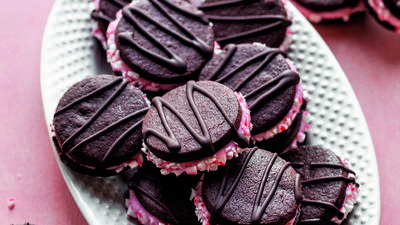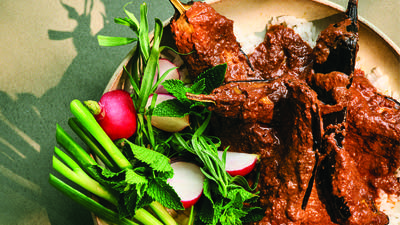
Running with Scissors author Augusten Burroughs is back with a new memoir, Lust & Wonder. He talks with David Leite about stability, compromise, his struggles with both, and how he's learning to "let the bread rise."
David Leite: Now for those people who have not yet read it, like I have, can you briefly sum it up for us?
Augusten Burroughs: Sure, it's Lust & Wonder, and it’s a memoir. It’s a love story, is how I think of it, but you’ve got to crawl through some broken glass for a little bit before you get to the love.
It’s also about the period of my life where I’ve been sober. I’ve been sober since 1999, so this is sort of a follow up to my previous memoir, Dry, about my experience with being an alcoholic, working in advertising. This is how my life has been without struggling with addiction and how I kind of made more of a mess of my life than I ever did before.
DL: You talk about this as the third installment in your trilogy of memoirs, with Running with Scissors, Dry, and Lust & Wonder. I’m curious, how do you see some of the themes that you began with years ago work themselves through the different memoirs? How are they the same and how are they different?
 Augusten Burroughs
Photo: Christopher Schelling
Augusten Burroughs
Photo: Christopher Schelling
AB: I didn’t really think of it as a trilogy until after the fact. But clearly it is. My first memoir was Running with Scissors, about growing up with my mentally ill mother and my alcoholic father’s lunatic psychiatrist in his house, with a bunch of family members and a bunch of long-term psychiatric patients.
That was a world where there were no rules; there was no structure. There was a lot of abuse going on in that crazy world. I think that experience honed my sense of humor for sure, because it was so awful that you sort of have to either find the humor in it, or just check out.
Finding security and stability and predictability was something that was very important for me in much of Lust & Wonder, and I made a lot of really dubious choices because of that search for stability and a guarantee. But you know, there really are no guarantees in life. One of the things that is really featured in the book a lot is, I started to doubt my gut instinct, and there was a heavy penalty for that.
DL: I thought what was really wonderful about the book is, it’s much more contemplative and thoughtful than some of the other books. I think your insights on relationships, especially long term relationships, are very keen and very spot on.
AB: I was thinking a lot about compromise. I was in a relationship for almost ten years with someone named Dennis, and I don’t think either of us were fully content and happy, but I kept telling myself, “This is what relationship experts and television and magazines all say. Compromise is part of a relationship."
But how much compromise? That’s something that I was thinking about a lot. How much compromise was I willing to tolerate? How much compromise ought a person tolerate and when is it too much?
DL: Speaking of Dennis, there is a hilarious section about Thanksgiving at his house, and you say in the book that cooking is his way of showing his love to you, but you also say that he used it as a weapon. He withheld food. He didn’t cook for you, and he used it as a controlling point. Can you talk a little bit about that dynamic of food in your relationship with Dennis?
AB: He was a very ambitious cook, and he loved to experiment and make very complicated meals, but when things were not going very well between us, he would make something that he knew I was not going to like. Or he would not make anything, and it would just be a very sort of sterile evening.
DL: Speaking of holidays and Thanksgiving and being at the table, I’m sure you must have quite a collection of memories, things that happened around the dinner table on holidays.
-Augusten Burroughs
AB: In my early childhood, when it was just living with my parents in western Massachusetts, holidays were sort of a somber affair. They were performed ritualistically. My parents were both Southern, so there was an element of things poured from cans, mixed together. Hams were from a can and scored with a knife, then cloves were inserted.
DL: Pre-glazed.
AB: But these were joyless occasions. They were just sort of ritualistically performed. When I was growing up in the psychiatrist’s house with his family, holidays were a lot more fun, but they were also a lot crazier. Many, many people dropped by. It was like a train station. It was messy and disorganized and crazy, but there was more love there. My holidays over the past few years have been really great and unusual, too. I have cooked more than I ever did.
DL: Do you enjoy cooking?
AB: I really do, and one thing that I have been really enjoying lately is making pine needle and rosemary bread, because we have a lot of pine needles, white pine, on the property.
DL: Have you found that your embrace of cooking goes along with your journey of becoming more settled with yourself?
AB: Absolutely. I’m not in crisis mode at all times. This is really like reading to me. I didn’t read a book until I was 24. Not because I couldn’t read, but because to read, you need peace and silence and space, physically and psychologically. It’s the same with cooking. My life has been about triage and putting out these emotional and psychological fires.
But it’s not like that now. It really isn’t. I’m in a much better, happier place, so there’s time to let bread rise.
[Ed. note: You can listen to Burroughs read an excerpt from Lust & Wonder in the audio clip above.]
Before you go...
Each week, The Splendid Table brings you stories that expand your world view, inspire you to try something new, and show how food connects us all. We rely on your generous support. For as little as $5 a month, you can have a lasting impact on The Splendid Table. And, when you donate, you’ll join a community of like-minded individuals who love good food, good conversation, and kitchen companionship. Show your love for The Splendid Table with a gift today.
Thank you for your support.
Donate today for as little as $5.00 a month. Your gift only takes a few minutes and has a lasting impact on The Splendid Table and you'll be welcomed into The Splendid Table Co-op.




